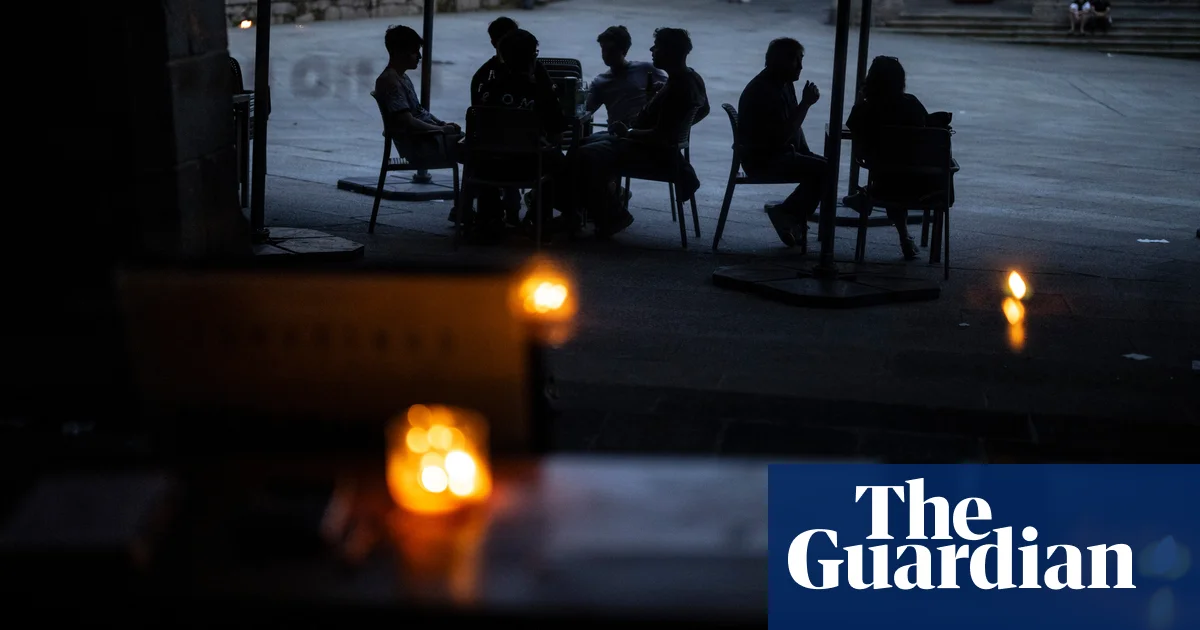“It felt like chaos,” said Iñigo, a doctor at a hospital in northern Spain.
With no electricity from noon on Monday, the building’s emergency generators were kept for the critical areas, leaving staff without access to patient data, broken communications due to no telephone signal or email, and colleagues unable to carry out some of their duties, he said.
The hospital’s backup generator was supposed to ensure surgeries continued, Iñigo said, but operations were forced to be cancelled due to out-of-order lifts and the inability to move patients around safely. “It made me realise we are so dependent on electronics,” he added.
About 55 million people were plunged into a pre-electric age on Monday, as Spain, Portugal and parts of southern France suffered the worst power outages in recent European history. Mobile signal was disrupted, traffic lights stopped working, supermarkets went dark and resorted to cash as digital payment systems stalled, and people were stranded far from their homes as the blackout stretched on for much of the day.
EU residents were urged last month to stockpile 72 hours’ worth of essentials, but the blackouts seem to have revealed the vulnerability of many people to widespread disruption.
After the outages, with service returning to normal levels, the Guardian spoke to people who got in touch as they reflected on what lessons to learn from the incident in terms of preparedness and resilience.
For Iñigo, even though the hospital outages felt like “a complete disaster” at the time, looking back, he’s thankful no one was physically harmed. “The best thing we can do [in future] is have more backup generators and fuel to keep things running as smoothly as possible,” he said.
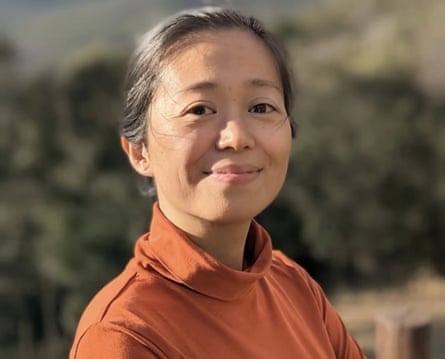
Beibei from Barcelona. Photograph: Beibei/Guardian Community
In Barcelona, Beibei, 41, at first found the outages “quite exciting”. It was only when her neighbour knocked on her door with her four-month-old baby and said: “You know it’s Europe-wide,” that she started to worry. “I saw my own fear in her face,” she said.
She wanted to pick up her six-year-old son from school, but needed to buy food first. “In nearly total darkness the shopkeepers were turning cashless customers away,” said Beibei, who works as a climate campaigner and has lived in Spain since the Covid pandemic. She picked up some essentials, but seeing other customers with trolleys full of food, she began to worry she didn’t have enough.
Beibei went out a second time with her neighbour. Their nearest supermarket had stopped letting in new customers. Another supermarket Beibei tried was on its last energy reserve: “As the cashier was taking items from my basket, I realised I didn’t have enough cash. Just then the last bit of power went completely, and she said: ‘Now you cannot take anything’.”
After collecting her son and reuniting with her family, Beibei said she will no longer take things for granted. “I’ve already taken out cash so I’m prepared for next time,” she added.
“It’s reset my perception of what matters in life. Every bit of food, the presence of people around us, the ease of cooking and washing with appliances, are all miracles that I’ll never overlook again.”
skip past newsletter promotion
Sign up to This is Europe
The most pressing stories and debates for Europeans – from identity to economics to the environment
Privacy Notice: Newsletters may contain info about charities, online ads, and content funded by outside parties. For more information see our Privacy Policy. We use Google reCaptcha to protect our website and the Google Privacy Policy and Terms of Service apply.
after newsletter promotion
The outages also led to people getting trapped in underground metro tunnels and on trains, with many people forced to walk along the tracks or stay in place for hours.
Doug Craib, a 60-year-old based in Brighton, boarded the 9.57am Madrid to Barcelona train to visit a friend on Monday. But before arriving, the train shuddered to a halt. There was no mobile signal, and the doors remained sealed for about two hours until authorities arrived, opened the doors and gave out bottled drinks, he said.
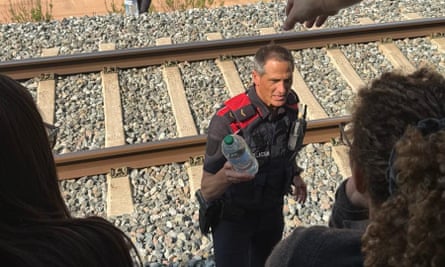
A police officer hands water to passengers stuck on a high-speed train. Photograph: Doug Craib/Guardian Community
He said a woman suffered a panic attack about six hours in. “The air in the carriages was thick and hot,” he said. As night fell, police eventually escorted passengers off the train with torches, and they walked with bags to a bus that took them to Barcelona, arriving about midnight, he said.
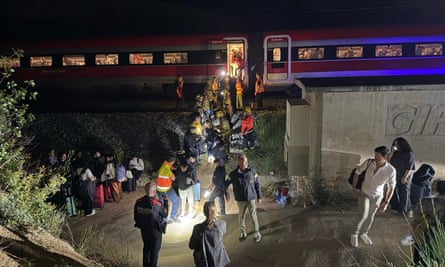
Passengers disembark from the train after several hours, and head for a bus to Barcelona. Photograph: Doug Craib/Guardian Community
Craib said the experience provoked a reevaluation of the trend towards digital-only transactions after many people were unable to purchase food or water.
“Literally every conversation I had in Barcelona with hotels, taxis and restaurants was tinged with the worry of the current trend to ditch cash,” he said. “All the payment systems went out here, and the only way you could transact was with cash, but most people had none, and the ATMs were down.”
Catarina, a 24-year-old engineer in Porto, was at her office when the power failed. She went home and filled up on water in case the pumps stopped carrying it to her third-floor apartment. She listened for updates on a wind-up radio she’d bought last month, after the EU urged people to make emergency precautions.
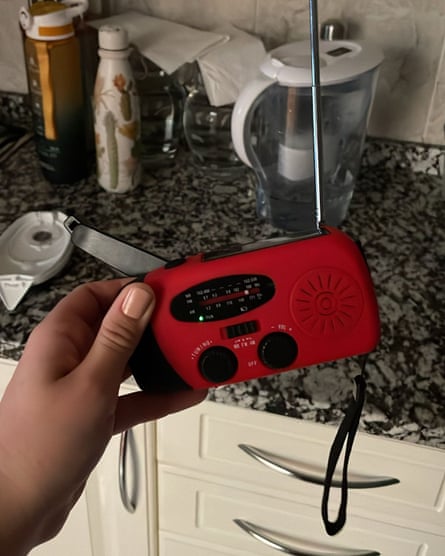
Catarina, in Porto, listened for news updates on a wind-up radio she bought last month, and stored water in case the pump stopped working. Photograph: Catarina/Guardian Community
“No one knew what to do, where to go, how long it would take,” she said.
“On the other hand, there’s a lot of discourse on how humanity is lost because of technology, but if yesterday shows us anything, it’s that it isn’t. When necessary, people stick together, go outside and act like a community again.”
With power still down at 5pm on Monday, Catarina went for a walk with her boyfriend – and what she saw made her feel hopeful. She saw cars stopping for pedestrians without traffic lights, large but orderly lines for buses, gardens full of people reading, playing sports, making BBQs with family, friends and neighbours, residents talking to passersby from their doorways.
“It was amazing,” she said. “Despite everything that went wrong, it gave me a lot of hope in humanity to see how quickly people got together and helped each other.”
